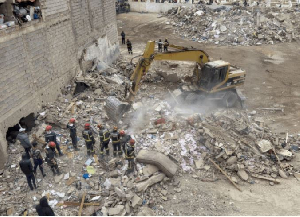..Because Officials are using their services
ACCRA - In northern Ghana, efforts are under way to disband six shelters for women accused of sorcery, known as "witch camps." Policy makers and some non-profit groups are working together to get the women reintegrated into their communities, but the plan is running into obstacles.
Witch camps are settlements for women banished or fleeing from their communities for alleged witchcraft. They are located in Gambaga, Kukuo, Gnani, Bonyansi, Naboli and Kpatinga - all scattered settlements in the northern region of Ghana.
More than 600 women and 300 children still reside in these camps despite decades of campaigning for the closure of such places.
_ActionAid_ (http://www.voanews.com/content/ghana-witch-camps-slow-to-close/940349.html#) Ghana is a human rights organization championing the rights of these women. The country director, Ajoa Kwarteng Kluvitse, says most people accused of witchcraft are old women or widows who lack support from influential people, or women whose actions do not fall within the communities' conception of normal behavior.
"There was one case where a young girl was extremely bright and the allegation was that she had used witchcraft to take the intelligence of her classmates. So if you are a woman who is extremely bright, very astute at business, is able to amass wealth, a woman who is challenging and not docile, any of these can lead to allegations of witchcraft," said Kluvitse.
Stigma
These isolated camps often lack running water, social services and education for the women's children. Kluvitse says many women hope that by going to these camps and subjecting themselves to tests, they can prove they are not sorcerers will be allowed to go back home. But she says the witch stigma is hard to shed.
"There are rituals that are gone through in all the camps which are supposed to determine your guilt or innocence. Usually it’s through a chicken and how the chicken dies when the neck is cut. Even if the chicken dies in a position that proves you are innocent, it is very difficult to return home," said Kluvitse.
Many women who pass the so-called innocence tests still do not go home for fear of attacks or they will be blamed for community deaths or other tragedies.
Kluvitse says ActionAid has been working to improve living conditions at the camps by providing clean water, clothing and skill training programs. She says the goal is not to turn the camps into permanent homes, but rather meet the fundamental human rights of these women and children.
The ultimate goal to to get these women reintegrated back into their communities. Although rights groups have been pushing for closure of the camps for decades, it was only the 2010 high profile burning of a alleged witch that spurred more official action to close the camps and discourage anyone from making witchcraft allegations.
Cultural attitudes
Concerns have been raised that the government and civil rights groups are not moving fast enough and that a detailed action plan is needed to facilitate disbanding the witch camps.
But, changing cultural attitudes across a country is a far larger task than ridding Ghana of witch camps. It is one of several reasons Kluvitse says closing the camps cannot be done overnight.
"A lot of these women left their homes 20 to 30 years ago," said Kluvitse. "Their huts left behind have been dilapidated. Somebody has to refurbish the huts. We need to see what skills we can give these women so they are not totally dependent on the family. We need to look at how to integrate their grand children and great grand children into school. So all these come at a cost ."
Kluvitse says the most important goal is not closing the camps but helping the women return back home with dignity, without having to face fresh allegations of witchcraft
General News of Thursday, 24 May 2012
Source: --












